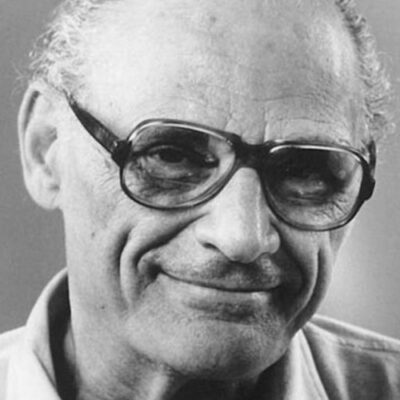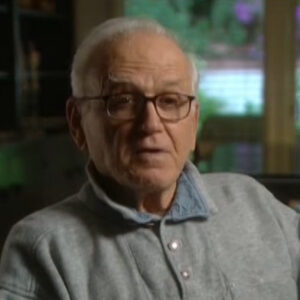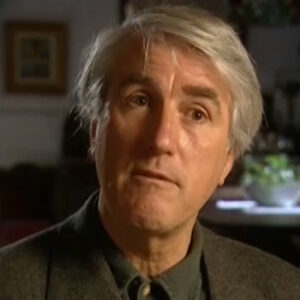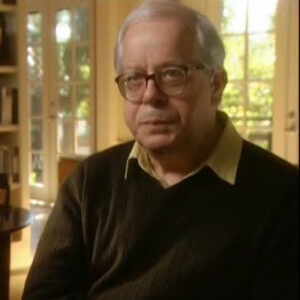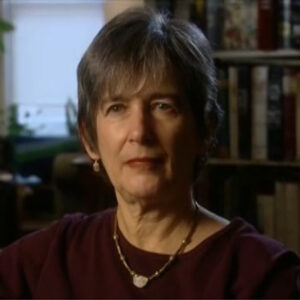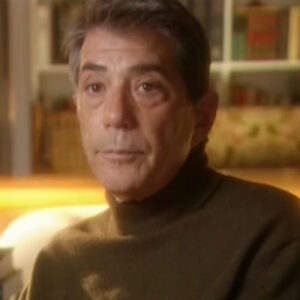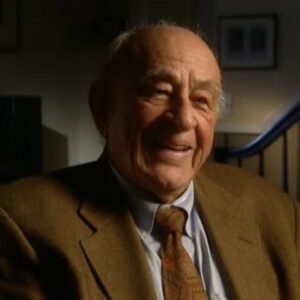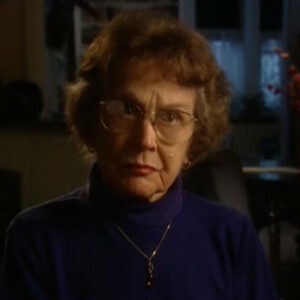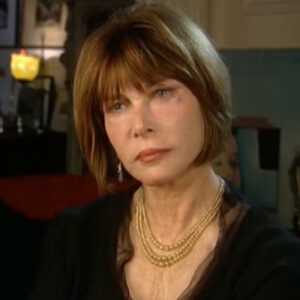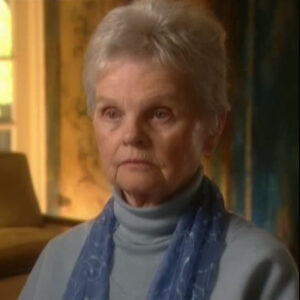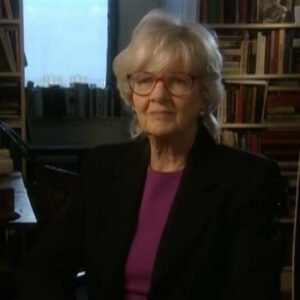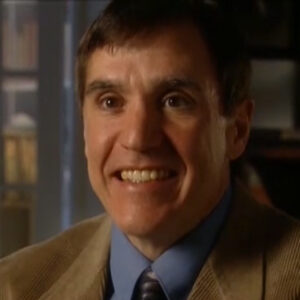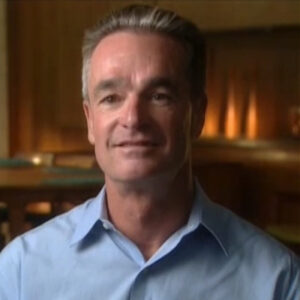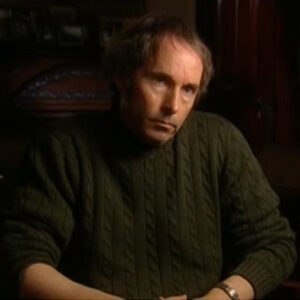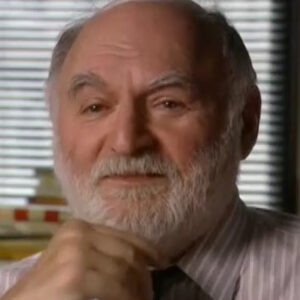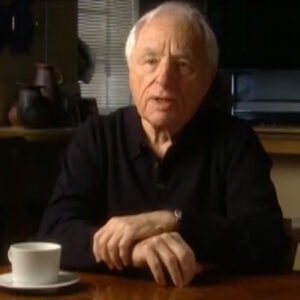Speaker Yeah, like, OK. Yeah. If you can remember for me, the first time you met Kazam.
Speaker What it was like, what was happening in the room were just to have Kisan in a room. Was he a commanding presence? Yeah.
Speaker Dynamic. Just something the bottom type wound up in there somewhere and yet amiable. And.
Speaker You know how it is, though, when you’re aware that somebody has some power, you may invest them.
Speaker With. More than they really are trying to demonstrate are are more than is being exuded by them in any conscious way. But, you know, he’s an important, powerful man. Although. I don’t remember where I first. I must have met him. In 1942. When he and Bobby Lewis put on a little one act play. Not a one, I play a short play. But it used to be the beginning of the dollar. Top theater, that was a notion they had. You’re going to have a seat for fifty five cents and dollar at top of the best. And I was one of a cast of about 20. And in that cast, the play was called a Mexican mural. Cezanne produced, Bobby Lowish directed. And that’s when I first knew him. And I heard about him then help me understand.
Speaker And again, I’m going to ask the only direction I want to give you is that my questions are going to be there. So when we’re talking about I try to just use their name. What was it like to be directed by kids? Was it like being directed by other directors, interaction the same? Do they ask you the same things?
Speaker Well, I never thought about Buzan as being somebody that was. That different, but I’m aware that he was different in so far as he was so intelligent and trenchant. And his attitude and his in his specific comments to you. I worked for him. Really? Death of a Salesman is the most prominent example of my connection with Kosan.
Speaker Having been a member of cash, by the way, I want to stop for a minute, if you ever catch me saying, you know, stop me. Fair enough. It’s recently I’ve been listening to everybody says, you know, every third word.
Speaker So, you know you to say it like. Right, I’ll stop you. That’s another way. Yeah, that’s another.
Speaker Well, what what what process did you go through with and Death of a Salesman to help you find. What you should be thinking or feeling or acting physically.
Speaker I have no specific recollection of him saying anything about my. Performance. If I have written about. My chance to play that part. In a little book called They’re Here all about the Invasion of the Body Snatchers. And if you read that, you’ll see that I described my experience. I was doing a scene at the Actors Studio on Morning and Cheryl Crawford was president present at the studio. You know, she was one of our. Artistic. No. Not artistic. She was one of the triumvirate who were. Responsible for creating the Actors Studio and chair, I was sitting there. He was a producer, in other words, who has spent part of her time at the studios as a figure. And this little scene was. An actress named Maggie Phillips that she and I were at. I think was based on a Tennessee Williams play it anyway. We read the scene, so-called reading, acting, not quite full performance, but she came up to me afterwards after that session, said, Kevin, I want you to go right down to the bathroom, Barrymore Theatre. I’ve just called Gadge and told him that you’re coming down there. She said, I think you’re going to be just right for what he’s looking for. I had no idea exactly what that was, but I went down to the Esso Barrymore Theater that Friday afternoon probably. It was Friday, I know that, because he gave me a script and said, come back on Monday. But. And he talked to me and said, you want me to study that, to play? It’s a new Arthur Miller play. And I want you to look at the part of Biff. Come back and read for us. I went home and looked at the script and studied it, and it was. That play. So how did he direct you in it?
Speaker Not even so much specifics, because it’s a long time ago. But what was the feel you get from Kisan as an actor if you’re being directed by you?
Speaker Well, you’ve cut me off there. Sorry, I hope the middle would tell a story of getting the part because Kazan was in the theater that Monday when I came back and the stage manager of Dell Hughes was one of the stage managers they used to use. And I read scenes all the probably all the scenes that Biff has, or most of them at any rate. And. I was with, you know, strange because the dark theater here, in there, all alone is a work like you’re the only actor there working with this stage manager and somewhere out madhouse Kazan. Is there.
Speaker And he’s he’s somebody you’ve got to make a decision. And I’ve finished, Tony. There was a silence.
Speaker And he came up the auction aisle, climbed up on the stage. He said, Kid. You’re gonna make one hell of a PIDF.
Speaker I thought to myself, this is terrific. I was, you know, at last.
Speaker We didn’t know it was Death of a Salesman, so to speak. That play that it was going to receive, that acclimation all over the world and still receive it as it does. But the stage manager said to me, I rather said to Kosan, Gadge, you know, after all, he it’s not clear that that we can’t get Ardie. Johnny really meant Johnny Kennedy. And Gadg said, no, we’re not going to get him out of his contract. I don’t think so. Miller wanted Arthur Kennedy, known as Arthur J. Kennedy, who knows Johnny sometime, but because of arts. We’ve got to have an answer and a Johnny. So art gets a heart attack at any rate. So I didn’t get the role because they got him out of his contract. But that’s how I happen to go to London when that’s when they decided on the success of this play. Even out of town was already seen that they were gonna be a tremendous, powerful thing that Kermit Bloomgarden had produced. So when they called up one day. Midsummer? No, not even midsummer. Probably spring. In nineteen forty nine and said, Would you like to go on the road? But Tommy Mitchell. Clemens gonna be directing.
Speaker And you can play Biff if you don’t have to do any reading or anything, just make a decision or you go to London with Paul Muni workers and I’ll be doing it. I said I’ll go to London because I knew how I felt about Clurman, liked him a lot, was inspired by him sometimes. But I knew there was no come no comparison as far as directing is concerned.
Speaker And why what is it about Kisan?
Speaker The ability to make things happen on the stage physically, not just. The emotional thing that you bring to it or the personality or the attitudes or whatever it is that you’re bringing to your performance or to the play. Kazan makes that stage live. It’s vibrant when you see it work. And on occasion, you’ll get a performance out of Kleman that looks as though that vibrancy is there. But it turns out maybe. That certain players seem to stage themselves. And Harold was lucky on some of the things that he got onto the stage and in and having success with.
Speaker Well, I’m trying. That’s beautiful. And I guess one of the questions I have that is. What is it about the process that comes and goes through that gets you to that moment where the stage explodes?
Speaker How is he different? Is it just that he’s smarter, that he’s more interesting and he’s more insightful?
Speaker Maybe all of those things, maybe none of that is some kind of an artist, obviously, or a great sports figure. They know what to do if you listen to them when they talk about what’s happening on the field or when they have a canvas in front of them, when they suddenly did begin to work and they see things in a certain way, demonstrate those things to you if they know what they want. Exactly. And throw the ball to you or take the brush stroke and make it.
Speaker Writers must experience it, too, of course. But I think he was an artist of some kind sportsman, a visual artist and an artist who has understood what’s going on inside most of us in life and has ways of bringing it past. Now, some of those ways derive from the excitement of being moving about and acting in a certain physical way on the stage. I think he calls for something from you. But you’ve got Marlon Brando. You don’t need anybody except somebody to focus what Brando brings as a tremendous performer.
Speaker Right. But other people talk about exactly what you’re tied with. He pulls things from, you know, the unexpected thing, the dangerous things. Yep.
Speaker You have. He sees these dangers and heightens them, perhaps. So it isn’t just somebody is walking across the stage. Yes. Ask somebody what’s going on, his elder walk in Dallas. Nobody’s just walking down the street. Something is happening. What’s happening when you’re moving from this point to that point? Great.
Speaker Now I ask you it again to use his name. What’s it like to be in a room with Kazam?
Speaker Well, to be in a room was Kosan is something that didn’t have to me that I was often in his presence, that G Actor’s Studio.
Speaker And a little bit in his presence before that time. But I hadn’t worked for him directly until I did Shale’s when he’d seen my work.
Speaker I know that. But just just because unfortunately, he’s not really there right now. He’s not the man he was in the late 40s and in the 50s. I’m I’m curious if he can paint a picture physically what his hands like.
Speaker It’s pretty difficult. I can see him in my mind’s eye when I’m sitting or out at the studio watching, I’ve seen Kisan might come in and. He doesn’t create a commotion when he appears, he just will slip into the room. Has anybody else but somehow, you know, he’s there at something is vibrating in him. He’s amiable.
Speaker Direct. Easy. I don’t care. I always called the kid. And. But compared to Strausberg. Who is a strangely reserved conservative kind of being?
Speaker But who thought of himself as being, of course, a very, very, very knowledgeable person compared to Kazami properly thought? I know a hell of a lot more about the theater than Kazan does. But that was a great difference between the two of them and Kisan.
Speaker It’s hard, it’s like sitting around anywhere with somebody that’s a little more dynamic than the next guy, you’re sitting around having a beer, a coffee or something. Whatever you’re doing and they’ve got a guy here is. He’s on. He’s sharp, he’s not just sitting there having a beer.
Speaker Something more is happening. That says, I think I’m saying about him on the stage. Things happen and being mirrors are happening almost for him.
Speaker How about Miller? Is he the same kind of presence? Does he feel the room?
Speaker Yeah. I’ve had a great experience of being with Miller when he directed me. Miller directed his one man in his Miller directed his play. All My Sons one summer. About two and a half, three years after I’d played for him in Broadway, I mean, let me go back and chances. I had the good fortune to be asked by Miller.
Speaker To go and play, Chris was the name of the character and all my sons. It’s somewhat similar to Beth, to all those key characters at Arthur. Kennedy played her almost almost the same figure running through those plays with Mellors and all my sons had been done. On Broadway.
Speaker And. Some somebody wanted him to run Miller to put it on, and he did it out at Arden, Delaware. And. He called me up and said, was I free to come out and spend a couple of weeks doing that play? I said, sure. So I had done the film of Death of a Salesman with. Stomp. Somebody quite ls directing the film. And I’ve done the play, of course. In London, which he was there directing me in.
Speaker It sounds as though nobody else was in that play. But let’s face it, Paul Muni, it is more than somebody who has everything in the world. He was terrific. He’s the kind of guy that said to me, those get upstaged, can take the stage, take the stage. The only would say to me when I was playing 50/50 with him. But at any rate, you get back to the summer theater production. Miller.
Speaker Was very strong and very full of talent that I didn’t even dream he had. He directed that play and brought so much humor to it. We had laughter in the theater. From his direction and what he saw. He’s got a lot of humor in his work and he can bring it to the stage. But he said, you know, Kazan was always a little bit. It felt kind of apologetic about the last scene in All My Sons, he said. But as I saw, it was like a pyramid. Act one, act two and Act three. Act three was short, but was a summation of lots that had happened before.
Speaker And go ahead. Don’t interrupt. I guess what I’m also looking for is some physical sense of what Miller was like.
Speaker Big range he a. He’s dynamic, too. I’ve handled a lot of time in his company, in his presence and. He had this he talked to me once. I tell you about something that happened during that performance. I. About what Miller said the.
Speaker I was playing this scene, which is very, very powerful scene, when the young son, who everybody’s waiting to find out what happened to the older brother who disappeared during in the Pacific during the war, and the fault was supposedly laid at the feet of his father, who had been putting up.
Speaker Airplane engines that were faulty and it’s quite possible that the sun went down in one of those planes that had a faulty crankcase or engine in it, whatever. And a letter comes that discloses.
Speaker What?
Speaker The fellow in the Pacific. Heard he heard about the troubles with the planes and heard about this and that and. You see, you get the feeling that maybe he just took his own plane and drove into the ocean in despair, thinking about what was wrong back home with what his father had been doing, something strange in that. The finding of that letter. And Chris getting it. And reading the letter to his father and his mother and a friend.
Speaker And I was just beside myself with a feeling of a lot of feeling. Let me just die. Come out. And boy, it was pouring out. Out there on the night before we opened, we had a preview audience and pocketbooks were opening.
Speaker Sniffles were going on. And who was so. I really got a hold of this, and it’s going to go and go and go. Play ended big applause. Miller came backstage and said, Kev, hey, kid. Terrific, terrific. All wrong, but terrific.
Speaker Oh, this. You can feel it. I’ve got all that same feeling inside me there now. And he should let me tell you. What does your father do? When he hears that letter and knows what he’s facing and is preparing anyway to get out of the police station and make some kind of a confession of his misdeeds in the running of the factory. And he hears this veteran, he goes into the house and puts a double barreled shotgun into his mouth and pulls the trigger. The brains are coming down the wallpaper and you’ve run in there when you hear the shot and you come back down the stairs, we see you come down the stairs, come down, come open the kitchen door, out the screen door, out to the porch and down steps the porch out to your mother and say, Oh, Mom, I didn’t mean I didn’t make you.
Speaker He should listen. And he described the scene in the room. He said, if I could put a mask on you, it would be a Greek mask.
Speaker There would be great eyes of horror peering out from your head. And somehow he said, you get down those stairs, somehow you open that Chris, you don’t open it. You walk through that kitchen door. You don’t do anything simple like that. Just walk through Donna’s steps and out into that garden where your mother is the. And that idea of the horror, he said, I don’t want that audience to have the pleasure of weeping their way through this last moment. I want them to go home, never forgetting what’s happened here.
Speaker That’s what I want. How can you do that?
Speaker Your teeth.
Speaker Does that have any use to you? Well, Arthur Miller of American pop culture.
Speaker Do these guys matter because any Miller matter in the early 50s?
Speaker Oh, hell, yes. Kosan and Miller matter. In the early 50s, there’s still mattering even today in a different way, of course, because we’re all a little bit older and. Our lives have changed considerably.
Speaker But I guess they’ve had some successes. So there are people’s lives, aren’t there? They’re what? They’re on people’s lives. Meet people.
Speaker Yes. And the name Kosan is almost in a common language, you’d think. And Miller is only one Miller that I think about.
Speaker And Justin Herman Miller, the furniture maker. It’s Arthur Miller and his. I always got a kick out of the way he is he’s a regular guy, big guy, strong but wise, intelligent. He came over and helped us put on the Siegel and Monty Clift mirror a stove and I and others were doing The Seagull down at the Phoenix Theatre. Nineteen hundred and forty five. And we were in trouble because nobody seemed to quite know. We had a great fellow directing. But he was. We took in. As our director, because we thought he’d leave us alone. What’s the thing to be doing what he had Sam Jaffe and will gear in that play and got in touch with Arthur and asked him if he’d come over and take a look. And he did. And he took a look at what we were doing.
Speaker He should Molly Guy Kit. He said, you got to you’re a young man, a gentleman of some kind. You’re not brooding around. You just stand up straight, you know, be the man that you should have been in in the society that you were a part of.
Speaker So, Miller. In the early 50s, how big a success is Death of a Salesman? How much is that kind of thing? Change the life of somebody like Miller from change the life of what? Arthur Miller. I guess what I’m looking at is these guys were they were celebrities, the kind of which they really about.
Speaker Well, here he became more of a celebrity with Death of a Salesman. Miller became a certainly a worldwide figure in Death of a Salesman. I contemporary thing worldwide. Frank Gehry was a museum in Bilbao worldwide. Happening has taken place, become known now as the greatest architect that’s working. Maybe or maybe not as great. He’s terrific. Well, Miller, in writing Death of a Salesman, it swept across well across not just our own society and our own.
Speaker Country, but England, China, wherever. Did it change you? I don’t know that it changed him. I think in a way it gave him. A sense of his own power. I think. He. I remember hearing a story about him. When somebody was up for something that they were having a meeting with Arthur Miller, this was after salesmen and so forth, and and they were meeting of the Russian tea room of this actor was meeting with Arthur Miller. Miller was trying to get him to do something in a play of his. No, I don’t remember who this actor was. I don’t remember what the play was, but it was interesting that Miller was in a position of having to. Sort of sell this guy.
Speaker I’m doing this play. Are you realizing? Do you realize you’re talking to the guy that wrote Death of a Salesman?
Speaker That’s not a bragging thing. I don’t think I think it’s an artist that has to say this is who I am.
Speaker And a certain kind of a person with a certain kind of gift, a certain kind of talent. And I could use your help. Don’t you think that’s what was there?
Speaker Honestly, a little bit more. I think that there a little bit of. Peacock strapped to it, too. Yeah, probably. I mean, oh, you know, I don’t watch.
Speaker I don’t slide. MIF buddy don’t fly.
Speaker Don’t slide me your. You’re a hundred percent, right. I’m. I’m I’m wrong. You’re not wrong. I think you’re right.
Speaker Let’s just move forward if I can’t. In 1952, kisan get subpoenaed. Before the House un-American activities, oh, yeah, yeah.
Speaker Do you remember in any way you we are a founding member of the Actor’s Studio. What the buzz was like in this studio before or after? Because you can get subpoenaed.
Speaker I don’t know why I’m not so aware of it. I remember thinking about and hearing about it.
Speaker And that was a time when we were all of us who had done anything that might be considered too liberal, might be named by somebody for something they had done. I was tried to leak out, tried to persuade me to join the Communist Party in nineteen hundred. And what was it. Forty. Forty three of L.A.. Forty three. Came to my came to my house for dinner one night. I knew him slightly as we were in there. We were in a play together and he was Mosshart Wing Victory. I was in the army actually and so was he. But he was discharged from the army and among other things, he said, let’s get together sometime. I thought like cops.
Speaker He hadn’t done Death of a Salesman or any of those things. But he was well-known, certain kind of an actor from the group theater and came to dinner and start talking me about the party. And I usually come and I said, what can I make up my own mind about things?
Speaker He said, well, you know, you have to sort of toe the line pretty much. And I often wondered if I were going to be named in the Red Channel’s magazine because I showed some interest in liberal causes. And yet I wasn’t known as a pinko.
Speaker But if you were named in that magazine was a monthly, you wouldn’t get any more work in radio or television. That’s for sure. This is a guy that had some connection with the Armstrong. I think the Armstrong. Company.
Speaker So when Kisan name names and he becomes a bit of a pariah, not a bit, he becomes a huge pariah. Do you remember any of the people putting him off?
Speaker I don’t remember that. I wasn’t in his presence at that frequently. But I do remember the there were certain members of of us that you thought up Marty Ritt and several others that sort of had. Tincture of the pink around them never sort of. You said one of the Stalinist these guys.
Speaker And. The.
Speaker If something was on my mind and slipped my mind. But nobody.
Speaker Where are we? There was a time.
Speaker OK. Hold on just a minute, sir. Just trying to think what Orito mother was. Talking about.
Speaker Well, I guess the question I had asked you to sort of work out was, do you remember any animosity towards Kisan any anger you are to hear it still.
Speaker Right. But inside the studio. No.
Speaker No, I was not aware of any hostility toward Kisan inside the studio.
Speaker I wasn’t always there. It may have happened, but because I was travelling back and forth, going out, let’s say, going to California. I got divorced about that time.
Speaker Well, not about that time was later that I got divorced. But. I was not always at the studio. I had other things to do. But as I said, something about some of the actors were. Clearly. People that had some I said tinge of pink about them and. You’re aware that you didn’t belong. They belonged in their way to something that I didn’t belong to.
Speaker One of the things that she had mentioned to me was that you knew Miller would come to his house a couple times. He knew Mary Miller. Yes. What was Mary like? Can you help me?
Speaker I just remember as being a tract of modest lady.
Speaker I, I, I don’t even quite see her anymore. But I went to the house, so I had dinner with her, overslept overnight. And one of the beds in their house, that was back in the time. And we were doing The Seagull at I mentioned to you.
Speaker Right. They were struggling at that point. I mean, Arthur was not the Arthur Miller we know now.
Speaker When one says when one thinks that Arthur Miller and Mary were struggling.
Speaker I don’t know what that means. Does it mean I never thought that they’re struggling to make a living? They had a house. That’s something.
Speaker I’ve always sort of felt the homeowners maybe struggling to make the payments was free to partner up.
Speaker But I guess, you know.
Speaker To the extent that you can’t you remember the marriage in any way is a.
Speaker I thought it was pretty nice. I guess there was this man, this. Decent guy, very decent guy. A strong. And sure of himself about a lot of things. I’ve got some letters from him, money, right, to mean. And. And but I’m so aware of his his fortitude.
Speaker And his strength. And his intelligence.
Speaker When Maryland came on the scene for Arthur, was that a big shock for any of you? He was leading, Mary, that he was getting involved with Marilyn.
Speaker That’s all. Stuff that comes out of sort of celebrity news. You know, I didn’t know anything about that. I just said, you know, to to die. That was just celebrity stuff, that kind of information. You knew that something was happening. Marilyn was not quite the big figure that she eventually became. She’s more she’s bigger now than she ever was. Celebrity wise, she goes on and on. But. I remember they were together when I did that small role of playing her husband in The Misfits back in nineteen sixty out in Reno. And Arthur and. Marilyn, I’d see them in the motel. She was always funny. She made me laugh every time she said anything. There was breaking up. And. Miller talked me into. Coming out and. Being in his picture. But actually, it wasn’t so much Miller as Frank Taylor, the producer of the picture here. Frank Taylor was Mary’s boss when he was in the public, in the publishing business, and Mary was his secretary. And that’s how. Frank Taylor got the right to make a film of the Miss Rich world.
Speaker We have eight minutes. I want to ask just a couple more questions, Kevin.
Speaker And I guess the other thing is this is in part a friendship about Arthur Miller and Alia Kisan and.
Speaker That that that early point, you’re you’re in the studio, you’re in Miller’s life.
Speaker I was in Miller’s life, but there were a lot of people who were much closer to him, and the same is true of Kisan.
Speaker I mean, some of the people were, you know. Daily consorts. You might say to each of these men in different ways and in different places. I was just. A member of the studio.
Speaker Let me ask you about the studio. What is it that you’re all trying to accomplish? Different. What are you trying to do in acting? What is Kisan trying to do with this studio?
Speaker Well, it’s a big question, but it’s not just you guys are founding not just any group of actors. I mean, you’re right.
Speaker I mean, I have to say, we’re a group of individuals.
Speaker Individuals.
Speaker I am in the Actors Studio, courtesy of the fact that Bobby Lewis, Gerald Crawford and Kazan determined that I was a certain kind of an actor and they wanted me to be in their group. There’s something somehow vaguely related to the group theatre, because they all came out of the group, as did Strausberg, who showed up later after Bobby, who was pulled out of the group, out of the studio, rather, and.
Speaker I, I use the studio to think about. What I was doing, I wasn’t trying to learn chapter and verse of bullous Lafsky or Stanislavski. I did some of the reading in those books and was probably. Probably have sense, a sense of some of this suggestions that were made about how you approach a part and what you do. But I. I was making my own method to come become whatever it was I was going to, was and would be, I would try to find a way to be a better. More successful actor, a better actor, wiser actor. So as I listened. I wasn’t.
Speaker Drinking in a common pool and taking it all down as the gruel that I should have in me or the liquid that should be coursing through my veins or my arteries.
Speaker I was just. Using this studio.
Speaker And if a studio used me OK, I’m there.
Speaker What’s the energy like, though? Is it a place that’s unique in any way?
Speaker Well, it’s unique, I guess, because of the talent that was there was unique reticle talent, and then the talent got to be more sort of famous because Strasberg had this impulse to become closer to come closer to celebrities. If you were famous, you more or less got an invitation to join the studio to be a part of the studio. Marilyn never had to audition the Daphne at the Actors Studio. But she was there a lot. I remember you. And you think about what Marilyn was like. I was sitting in the front row of one of these studios that we were working in the Malins studio. One morning and they were doing, curiously enough, the three sisters, some somebody was doing a scene from the three sisters on the stage, a couple of actresses, you probably never get on with it. We’re going to be here forever. And I said something to that effect. It’s perfect. It was the day that it’s sitting next to me. It is. I don’t know what that was next to me. A blonde, frowzy kind of figure was sitting beside me. And Strasbourg is upbraiding me for not having the patients I should have.
Speaker And you could use some of this in yours. You’re acting, Mr. McCarthy, to take your time and not always go speeding along at this. Purchases are coming alive over here. Turned out to be Maryland.
Speaker She was suddenly not just a frowzy blonde. She was some sort of spectacular looking figure. Just no makeup, anything. Just herself. Vivid and vibrating. I can’t tell you my favorite Marilyn Monroe story, because it favors me too well. She saw me do a scene at the Actors Studio. She saw me do a scene at the Actors Studio, and she was so taken with a Strausberg.
Speaker Let’s do a bit of to put the room down.
Speaker OK. My heart is beating in that room tone. Yes. Thank you so much. Thank you. Thank you. I hope it wasn’t too cold. No. No. Yeah. No, I was fired.
Speaker Gelberg.

